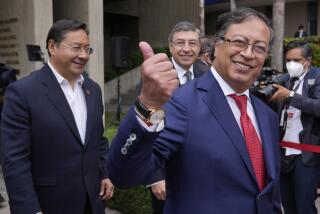LATIN AMERICA : Scandal Spooks Colombian Investors : Locals are selling off stocks, fearful that their president’s alleged ties to drug lords will cause foreigners to do the same.
- Share via
BOGOTA, Colombia — Anticipating foreign reaction as a major drug scandal creeps devastatingly closer to the presidency, traditionally cool Colombian investors have caught the jitters, selling off stocks and changing pesos for dollars.
Medellin stock exchange prices dropped 5.4% in dollar terms, and the peso devalued 6.4% in August as investors reacted to mounting evidence that President Ernesto Samper’s 1994 campaign may have accepted as much as $6.2 million from the Cali cocaine cartel. As investigations continue, speculation increases that the government could fall.
Analysts said that while the new skittishness does not represent an immediate threat to the economy, it underscores the growing influence of foreign money in this nation where political disasters usually do not cause a blip in the markets.
“The arrival of dozens of new foreign funds during the last two years has changed the way local investors look at the market,” said Rue Swabey, an analyst at Barings Securities in Bogota. “Local investors fear that foreigners are going to react to the political crisis, and they have preempted them by selling their stocks.”
After Colombia eliminated capital gains and dividend taxes in 1992, the number of foreign funds investing in the Bogota market nearly doubled, reaching 117 in June, 1995. Foreign portfolio investment now is about $800 million--enough to affect a small, illiquid market worth $16 billion, equal to just over one-quarter of this nation’s economy.
Local investors feel a peculiar sense of vulnerability. While neither the assassination of favored presidential candidate Luis Carlos Galan in 1989 nor the prison break of drug lord Pablo Escobar in 1992 affected the market, Bogota’s Stock Exchange Index dropped 4.3% on Aug. 1 after former campaign treasurer Santiago Medina testified that Samper solicited drug money.
The market had begun to recover, when, two weeks later, former campaign manager Fernando Botero Jr. was arrested on charges of receiving illegal funds. Bogota stocks quickly fell 2.2% in dollar terms, and the peso dropped 1.7%.
“Ironically, foreign funds are not selling their stocks but are even buying a bit to take advantage of low prices,” said another market analyst. “Local investors do not understand their mentality and are afraid.”
Colombia, along with Chile, regularly receives the highest investment ratings in Latin America. Conservative fiscal and monetary policies, along with money from coffee and cocaine, allowed the Colombian economy to grow an average of 4% a year during the “lost decade” of the 1980s, when most economies in the region were struggling.
Strict regulations on foreign investment and strong foreign reserves of $8.4 billion prevented the massive withdrawal of international funds known as the “tequila effect,” which hit nations such as Argentina and Brazil following the Mexican economic crash in December.
So far, the value of Colombian bonds abroad has varied little since the crisis began, and there is no evidence of a pullout of direct foreign investment.
But analysts say that Colombian businesses already have put investment plans on hold and could begin to sell real estate and other property if new evidence emerges against the president.
They add that Samper has relied on this nation’s largest economic groups to sustain his administration. However, business support for the president will evaporate as soon as his survival begins to cost firms more money than his fall would, analysts predict.
“People fear that when the president falls, the economic situation will destabilize and the peso will devalue even more than it has,” said Fanny Kertzman, editor of Dinero, a business magazine.
But she is betting those fears are misplaced. “On the contrary,” she said, “the panic will subside only when he does resign.”
Kertzman said the man next in line, Vice President Humberto de la Calle, is viewed more favorably by business.
More to Read
Sign up for Essential California
The most important California stories and recommendations in your inbox every morning.
You may occasionally receive promotional content from the Los Angeles Times.













